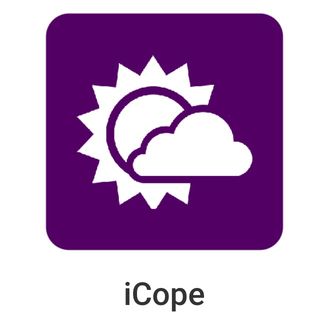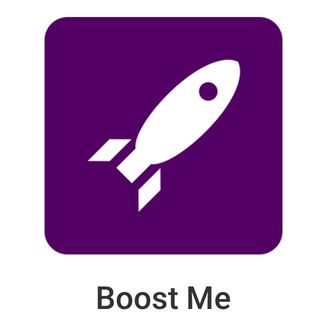Anxious or Depressed? 'IntelliCare' Is an App Suite for That
NIH-funded study is testing a state-of-the-art suite of 13 mental health apps

"iCope" is one of thirteen apps in the IntelliCare
suite of smartphone apps created by researchers at Northwestern
University in a partnership with the National Institutes of Health (NIH).
Source: Screenshot by Christopher Bergland
The team of researchers from the Center for Behavioral Intervention Technologies (CBITs), Department of Preventive Medicine at Northwestern University, who developed IntelliCare, published initial findings from their ongoing nationwide study today in the Journal of Medical Internet Research.
This preliminary study evaluated the efficacy of the IntelliCare framework for the first time. And there is good news! The researchers report that of the 96 participants who completed the study, approximately 50 percent reported a decrease in the severity of depressive and anxiety symptoms.
In fact, the Northwestern researchers found that short-term reductions of anxiety and depression after using IntelliCare for 8 weeks were comparable to results expected in clinical practice using psychotherapy or the use of antidepressant medications. That said, from a clinical perspective, the researchers emphasize that in cases of a Major Depressive Episode (MDE) and other serious mental health disorders patients should always seek face-to-face professional help.
The researchers estimate that more than one in five Americans suffer from significant symptoms of depression or anxiety each year. Unfortunately, only around 20 percent of people with a mental health problem receive adequate treatment.
What Makes IntelliCare Groundbreaking and Unique?
There are countless—potentially costly—mobile phone apps designed to improve psychological and physical well-being. What sets IntelliCare apart is that it’s the first suite of multiple smartphone apps tailored to create a unique platform that can be fine-tuned and adapted to address a host of mental health issues and lifestyle habits for each user.To the best of my knowledge, IntelliCare is the only smartphone app of its kind being field tested across the country by clinical psychologists in conjunction with the national institutes of health. IntelliCare is currently an ongoing national research study.
Anyone can download a single IntelliCare app or the entire suite for free from Google Play and use IntelliCare to your heart’s content with absolutely zero financial obligation. Although IntelliCare is currently only available through Google Play, the researchers are working to make the platform available at the Apple iPhone app store in the near future.
In a statement to Northwestern, David Mohr, professor of preventive medicine and director of the Center for Behavioral Intervention Technologies at the Feinberg School of Medicine described the IntelliCare platform saying,
article continues after advertisement
"We designed these apps so they fit easily into people's lives and could be used as simply as apps to find a restaurant or directions. Some of the participants kept using them after the study because they felt that the apps helped them feel better. There were many apps to try during the study, so there was a sense of novelty.The IntelliCare apps are designed to be intuitive and require very few instructions. Each of the thirteen apps contains a bullet point of quick “tips” on the home screen that help guide the user through his or her first interaction with each new tool.
Using digital tools for mental health is emerging as an important part of our future. These are designed to help the millions of people who want support but can't get to a therapist's office.
We now have evidence these approaches will likely work. They are designed to teach many of the same skills therapists teach patients. Different apps are expected to work for different people. The goal is to find what's right for you."
The 13 IntelliCare Apps Can Be Tailored to Create a Personalized Program
- IntelliCare Hub: Uses an algorithm that manages personalized messages and notifications for each user from the other apps within the IntelliCare framework.
- Aspire: Guides user to identify the values that inspire one’s life and specific actions someone does to live these values. Aspire helps keep track of these actions throughout the day and supports the user in living a more purpose-driven and satisfying life.
- Day to Day: Delivers a daily stream of tips, tricks, and other information throughout the day designed to boost the user’s mood. Day to day prompts the user to work on a particular theme each day, which changes every week. And to learn more about how to effectively cultivate gratitude, activate pleasure, increase connectedness, solve problems, and challenge one’s thinking.
- Daily Feats: Encourages the user to incorporate worthwhile and productive activities into the day. Users add accomplishments to the Feats calendar, where they track their positive activity streaks and ratchet up by completing more tasks. Daily Feats helps motivate users to spend their days in more meaningful, rewarding ways with the goal of increasing overall satisfaction in life.
- Worry Knot: Teaches the user to manage worry using lessons, distractions, and other worry management tools. Worry Knot provides a guided tool to address specific problems that a user can't stop thinking about and provides written text about ways to cope with tangled thinking. Worry Knot also presents statistics about progress as the user practices coping with worry, gives daily 'tips and tricks' for managing worry and provides customizable suggestions for ways to distract oneself.
- Social Force: Prompts the user to identify supportive people in their lives, and provides encouragement for the user to get back in touch with these positive people.
- My Mantra: Prompts the user to create mantras (or repeatable phrases that highlight personal strengths and values that can motivate the user to do good and feel good). My Mantra constructs virtual photo albums to serve as encouragement and reminders of these mantras.
- Thought Challenger: Guides the user through an interactive cognitive restructuring tool to examine thoughts that might exaggerate negative experiences, lead someone to be overcritical and bring down one’s mood. Thought Challenger teaches the user to get into the habit of changing perspective and moving toward a more balanced outlook on life.
- iCope: Allows the user to send oneself inspirational messages and reassuring statements, written in their own words, to help the user get through tough spots or challenging situations.
- Purple Chill: Provides users with a library of audio recordings to relax and unwind. Purple Chill teaches a variety of relaxation and mindfulness practices to de-stress and worry less.
- Move Me: Helps the user select exercises to improve mood. Move Me provides access to curated exercise videos and to written lessons about staying motivated to exercise. This app allows the user to schedule motivational exercise time for oneself throughout the week.
- Slumber Time: Prompts the user to complete sleep diaries to track sleep. Slumber Time provides a bedtime checklist intended to clear one’s mind before going to sleep. It also provides audio recordings to facilitate rest and relaxation and features an alarm clock function.
- Boost Me: Encourages users to select and schedule positive activities (“boosts”) whenever the user notices a drop in his or her mood. Boost Me tracks specific activities the user tags as positively impacting mood. This app includes animated mood tracking for pre/post positive activities, calendar integration, and suggested activities that are auto-populated based on past mood improvement.
article continues after advertisement
As
you can see, the suite of thirteen different IntelliCare apps described
above offers a multi-faceted approach for the treatment of anxiety and
depression. It also offers fresh techniques to help make your life feel
more meaningful ... mantras to reframe your explanatory style,
strategies for moving your body more, sleeping better and much, much more.The IntelliCare algorithm automatically recommends new apps each week to keep the user’s experience engaging by providing ever-changing opportunities to learn new skills. This prevents boredom. Although these apps are not technically validated, each of the thirteen IntelliCare apps was designed by Northwestern clinicians and based on validated techniques used by professional therapists.

IntelliCare's "Boost Me" app takes a multi-pronged approach to help keep your spirits up.
Source: Screenshot by Christopher Bergland
On average, IntelliCare users interacted with one of the thirteen apps for about a minute up to four times daily—or an average of 195 times throughout the eight weeks of the study.

